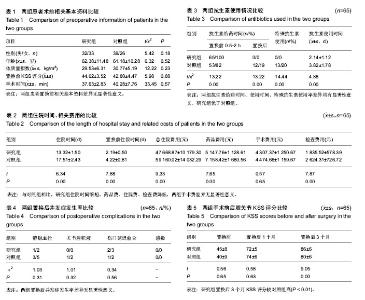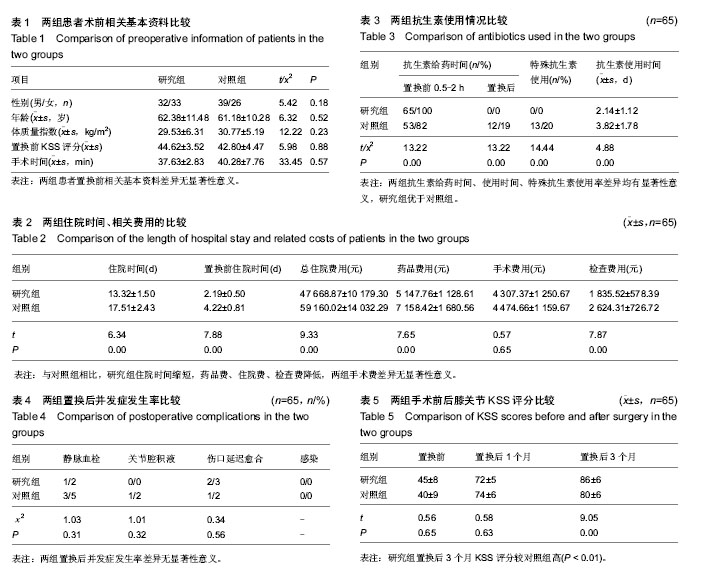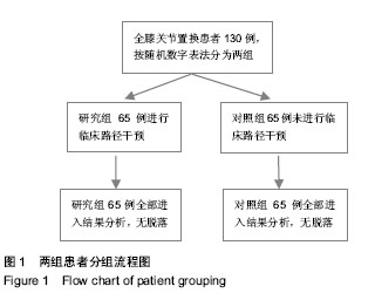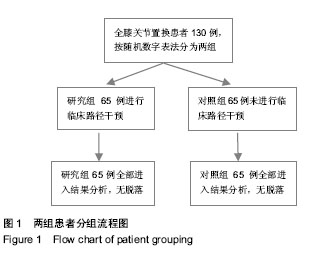Chinese Journal of Tissue Engineering Research ›› 2015, Vol. 19 ›› Issue (9): 1340-1344.doi: 10.3969/j.issn.2095-4344.2015.09.00
Previous Articles Next Articles
Clinical pathway and effectiveness of total knee arthroplasty
Wang Yang, Liu Yi-chao, Ma Jun
- Department of Joint Surgery, First Affiliated Hospital of Xinjiang Medical University, Urumqi 830054, Xinjiang Uygur Autonomous Region, China
-
Revised:2015-02-07Online:2015-02-26Published:2015-02-26 -
Contact:Ma Jun, Department of Joint Surgery, First Affiliated Hospital of Xinjiang Medical University, Urumqi 830054, Xinjiang Uygur Autonomous Region, China -
About author:Wang Yang, Master, Physician, Department of Joint Surgery, First Affiliated Hospital of Xinjiang Medical University, Urumqi 830054, Xinjiang Uygur Autonomous Region, China
CLC Number:
Cite this article
Wang Yang, Liu Yi-chao, Ma Jun. Clinical pathway and effectiveness of total knee arthroplasty[J]. Chinese Journal of Tissue Engineering Research, 2015, 19(9): 1340-1344.
share this article

2.2 两组一般基本资料比较 两组患者在性别、年龄、体质量指数、置换前KSS评分、手术时间上比较差异均无显著性意义(P > 0.05),见表1。 2.3 两组住院时间、置换前住院时间、总住院费用、药品费用、手术费用、检查费用比较 研究组住院时间、置换前住院时间较对照组缩短;研究组总住院费用、药品费用、检查费用较对照组低,差异有显著性意义(P < 0.01);两组手术费用比较差异无显著性意义,见表2。 2.4 两组预防使用抗生素给药时间、抗生素使用时间、特殊抗生素使用率比较 研究组与对照组置换前给药率分别为100%与82%,差异有显著性意义(P < 0.01);两组特殊类抗生素使用率分别为0与20%,差异有显著性意义(P < 0.01);研究组预防用药时间较对照组缩短,差异有显著性意义(P < 0.01),见表3。 2.5 两组置换后并发症的比较 两组置换后静脉血栓、关节腔积液、伤口延迟愈合、感染等并发症发生情况差异无显著性意义(P > 0.05),见表4。 2.6 两组置换前后膝关节KSS评分比较 两组患者置换前及置换后1个月KSS评分差异无显著性意义(P > 0.05),研究组置换后3个月KSS评分较对照组高,差异有显著性意义(P < 0.01),见表5。"

| [1] Pearson SD, Goulart-Fisher D, Lee TH. Critical pathways as a strategy for improving care: problems and potential. Ann Intern Med. 1995;123(12):941-948. [2] Ayalon O, Liu S, Flics S, et al. A multimodal clinical pathway can reduce length of stay after total knee arthroplasty. HSS J. 2011;7(1):9-15. [3] Lin YK, Su JY, Lin GT,et al. Impact of a clinical pathway for total knee arthroplasty.Kaohsiung J Med Sci. 2002;18(3): 134-140. [4] Kim TK, Chang MJ, Kim SJ, et al. Continuous Improvements of a Clinical Pathway Increased Its Feasibility and Improved Care Providers' Perception in TKA. Knee Surg Relat Res. 2014;26(4):199-206. [5] Duncan CM, Moeschler SM, Horlocker TT, et al. A self-paired comparison of perioperative outcomes before and after implementation of a clinical pathway in patients undergoing total knee arthroplasty. Reg Anesth Pain Med. 2013;38(6): 533-538. [6] Gliesche K, Timm J, Mühlbauer B, et al. Pathway-controlled fast-track rehabilitation after total knee arthroplasty: a randomized prospectiveclinical study evaluating the recovery pattern, drug consumption, and length of stay.Arch Orthop Trauma Surg. 2012;132(8):1153-1163. [7] Krummenauer F, Guenther KP, Kirschner S. Cost effectiveness of total knee arthroplasty from a health care providers' perspective before and after introduction of an interdisciplinary clinical pathway--is investment always improvement? BMC Health Serv Res. 2011;11:338. [8] den Hertog A, Gliesche K, Timm J, et al. Pathway-controlled fast-track rehabilitation after total knee arthroplasty: a randomized prospective clinical study evaluating the recovery pattern, drug consumption, and length of stay. Orthop Trauma Surg. 2012;27:336-340. [9] 卫生部,国家中医药管理局,总后卫生部.抗菌药物临床应用指导原则[S].卫办医政发[2004]285号. [10] 王锴,彭丹丹,林剑浩. 实施临床路径对人工膝关节置换术住院费用的影响分析[J].中国卫生经济,2013,11(32):30-32. [11] Husni ME, Losina E, Fossel AH,et al. Decreasing medical complications for total knee arthroplasty: Effect of Critical Pathways on Outcomes. BMC Musculoskelet Disord. 2010; 11:160. [12] Scott T, Kevin L, Arthur L. Complications, Mortality, and Costs for Outpatient and Short-Stay Total Knee Arthroplasty Patients in Comparison to Standard-Stay Patients. BMC Health Services Res. 2014;29(3):510-515. [13] Kirschner S, Lützner J, Günther KP,et al.Clinical pathway for total knee arthroplasty. I: Pathway Conceptionan deffecton functional quality of results. Orthopade. 2010;39(9):853-859. [14] 颜岚,方红霞.临床路径在膝关节置换术病人中的应用[J]. 创伤外科杂志,2012,14(5):456. |
| [1] | Chen Ziyang, Pu Rui, Deng Shuang, Yuan Lingyan. Regulatory effect of exosomes on exercise-mediated insulin resistance diseases [J]. Chinese Journal of Tissue Engineering Research, 2021, 25(25): 4089-4094. |
| [2] | Chen Yang, Huang Denggao, Gao Yuanhui, Wang Shunlan, Cao Hui, Zheng Linlin, He Haowei, Luo Siqin, Xiao Jingchuan, Zhang Yingai, Zhang Shufang. Low-intensity pulsed ultrasound promotes the proliferation and adhesion of human adipose-derived mesenchymal stem cells [J]. Chinese Journal of Tissue Engineering Research, 2021, 25(25): 3949-3955. |
| [3] | Yang Junhui, Luo Jinli, Yuan Xiaoping. Effects of human growth hormone on proliferation and osteogenic differentiation of human periodontal ligament stem cells [J]. Chinese Journal of Tissue Engineering Research, 2021, 25(25): 3956-3961. |
| [4] | Sun Jianwei, Yang Xinming, Zhang Ying. Effect of montelukast combined with bone marrow mesenchymal stem cell transplantation on spinal cord injury in rat models [J]. Chinese Journal of Tissue Engineering Research, 2021, 25(25): 3962-3969. |
| [5] | Gao Shan, Huang Dongjing, Hong Haiman, Jia Jingqiao, Meng Fei. Comparison on the curative effect of human placenta-derived mesenchymal stem cells and induced islet-like cells in gestational diabetes mellitus rats [J]. Chinese Journal of Tissue Engineering Research, 2021, 25(25): 3981-3987. |
| [6] | Hao Xiaona, Zhang Yingjie, Li Yuyun, Xu Tao. Bone marrow mesenchymal stem cells overexpressing prolyl oligopeptidase on the repair of liver fibrosis in rat models [J]. Chinese Journal of Tissue Engineering Research, 2021, 25(25): 3988-3993. |
| [7] | Liu Jianyou, Jia Zhongwei, Niu Jiawei, Cao Xinjie, Zhang Dong, Wei Jie. A new method for measuring the anteversion angle of the femoral neck by constructing the three-dimensional digital model of the femur [J]. Chinese Journal of Tissue Engineering Research, 2021, 25(24): 3779-3783. |
| [8] | Meng Lingjie, Qian Hui, Sheng Xiaolei, Lu Jianfeng, Huang Jianping, Qi Liangang, Liu Zongbao. Application of three-dimensional printing technology combined with bone cement in minimally invasive treatment of the collapsed Sanders III type of calcaneal fractures [J]. Chinese Journal of Tissue Engineering Research, 2021, 25(24): 3784-3789. |
| [9] | Qian Xuankun, Huang Hefei, Wu Chengcong, Liu Keting, Ou Hua, Zhang Jinpeng, Ren Jing, Wan Jianshan. Computer-assisted navigation combined with minimally invasive transforaminal lumbar interbody fusion for lumbar spondylolisthesis [J]. Chinese Journal of Tissue Engineering Research, 2021, 25(24): 3790-3795. |
| [10] | Hu Jing, Xiang Yang, Ye Chuan, Han Ziji. Three-dimensional printing assisted screw placement and freehand pedicle screw fixation in the treatment of thoracolumbar fractures: 1-year follow-up [J]. Chinese Journal of Tissue Engineering Research, 2021, 25(24): 3804-3809. |
| [11] | Shu Qihang, Liao Yijia, Xue Jingbo, Yan Yiguo, Wang Cheng. Three-dimensional finite element analysis of a new three-dimensional printed porous fusion cage for cervical vertebra [J]. Chinese Journal of Tissue Engineering Research, 2021, 25(24): 3810-3815. |
| [12] | Wang Yihan, Li Yang, Zhang Ling, Zhang Rui, Xu Ruida, Han Xiaofeng, Cheng Guangqi, Wang Weil. Application of three-dimensional visualization technology for digital orthopedics in the reduction and fixation of intertrochanteric fracture [J]. Chinese Journal of Tissue Engineering Research, 2021, 25(24): 3816-3820. |
| [13] | Sun Maji, Wang Qiuan, Zhang Xingchen, Guo Chong, Yuan Feng, Guo Kaijin. Development and biomechanical analysis of a new anterior cervical pedicle screw fixation system [J]. Chinese Journal of Tissue Engineering Research, 2021, 25(24): 3821-3825. |
| [14] | Lin Wang, Wang Yingying, Guo Weizhong, Yuan Cuihua, Xu Shenggui, Zhang Shenshen, Lin Chengshou. Adopting expanded lateral approach to enhance the mechanical stability and knee function for treating posterolateral column fracture of tibial plateau [J]. Chinese Journal of Tissue Engineering Research, 2021, 25(24): 3826-3827. |
| [15] | Zhu Yun, Chen Yu, Qiu Hao, Liu Dun, Jin Guorong, Chen Shimou, Weng Zheng. Finite element analysis for treatment of osteoporotic femoral fracture with far cortical locking screw [J]. Chinese Journal of Tissue Engineering Research, 2021, 25(24): 3832-3837. |
| Viewed | ||||||
|
Full text |
|
|||||
|
Abstract |
|
|||||

